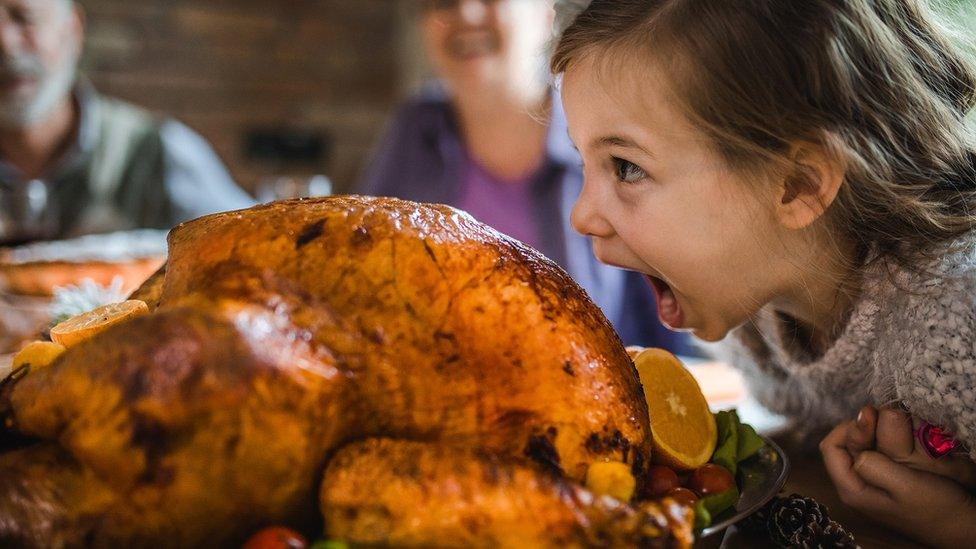Christmas dinner: What's your family's twist on turkey and trimmings?
- Published
- comments

Food is a big part of Christmas, but there are lots of different versions of a Christmas dinner.
Some people want a plant-based dinner because they're vegetarian or vegan, other families combine cuisines from different cultures and background with the special meal, and for some, they simply don't like turkey!
So what do you prefer to have for your Christmas dinner? Let us know in the comments below.
Newsround presenter De-Graft enjoys jollof rice at Christmas
Newsround presenter De-Graft's family is from Ghana, which means one specific type of Ghanaian food is at the centre of his family table on Christmas day!
"When my family meets for Christmas, we have the traditional roast; we go for chicken not turkey, because none of us really like turkey, roast potatoes, there might be some Yorkshire puddings, gravy, vegetables...
"But the centrepiece of the table is jollof rice!"
Meanwhile Shanequa's family meal has Jamaican influences.
"We always have rice and peas. It's a Jamaican dish that's basically rice cooked with kidney beans and coconut milk. I will always pile my plate full of it!"
Sameena says: "We all love traditional home cooked Indian food in our family but everyone is busy, and only a few of us are good cooks, so Christmas is a time when we can actually get together and have it.
"So we either put a spicy Indian spin on a traditional British Christmas dinner or opt for something Indian like biriyani! And we have to make sure there's lots left over for anyone in the family who's working on Christmas day too."
But Nina, Newsround's newest presenter, has had fussy siblings to deal with!
"We normally would have chicken but that's mainly because my brother and sister were fussy when they were little. My dad also doesn't like roast dinner so he'll make his own food."
Newsround's Shanequa says: "We always have rice and peas. It's a Jamaican dish that's basically rice cooked with kidney beans and coconut milk. I will always pile my plate full of it"
People have also been sharing their alternative Christmas meals on social media too.
Lisa in Hull, says her family isn't keen on turkey and has American style fried chicken or barbeque ribs on Christmas day.
Meanwhile Joanne and her three children enjoy a curry for their festive feast.
Eve in Poole said she "loves a big bag of fish and chips on Christmas eve!" We're guessing the chip shop isn't open on Christmas Day, Eve!
Elsewhere, Nicky had a vegetarian Christmas dinner at school which included a feta cheese, spinach and cranberry roll. "It was amazing," she says.
Why do some people eat turkey on Christmas Day anyway?
The turkey dominance of Christmas dinner tables is a fairly recent thing.
During most of the last 500 years, beef was actually the most popular meat of choice.
Turkeys don't originally come from Britain and are native to central America. In the 16th century ships returning to Spain from the Americas were ordered to bring back ten turkeys each.
By the 1530s they were being farmed in France and in 1541, families in England were told by law that they could only have one turkey per feast, meaning they were seen as an expensive, luxury food.
Turkeys were imported to Britain from central America, but also from Turkey the country, and that's where the name comes from.
US kids explain Thanksgiving
It's thought early European settlers in America shared turkey meat with Native Americans as part of the first official Thanksgiving meal in 1621, which has become a tradition for the holiday in the US ever since.
By the 19th century in Britain, turkey was a popular meat to eat at Christmas time, but rich people still often preferred to eat other things such as beef.
For poorer people, turkey was too expensive and many people would have goose instead.
After the First and Second World War of the 20th century, meals were smaller, even for the rich and roast dinners started to include one meat only and smaller portions.
By the 1950s, American culture began to influence British habits and turkeys seen at Thanksgiving dinners, began to become a festive favourite for Christmas time in Britain too.
So whether it's turkey, your family's traditional food or a special recipes, have a fantastic festive feast and don't forget to tell us what you plan to eat in the comments below!
- Published24 December 2022
- Published27 December 2023
- Published21 December 2022
